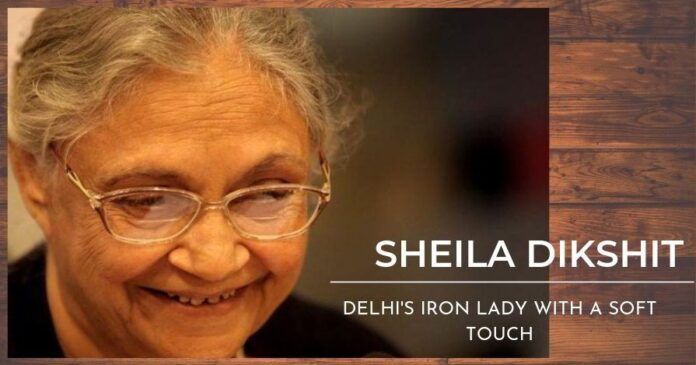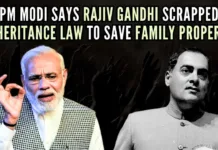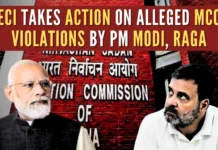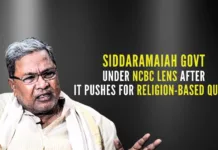
Rahul Gandhi has called Sheila Dikshit the “daughter of Congress”. That she was, and she was Delhi’s daughter too.
When a prominent figure dies, there is a rush among people, both those who knew the deceased well and those who had a fleeting association, to stay the nicest things about the person. Compliments that were never given to the person when alive, come in a torrent. It is politeness and an overriding sense of decency that prevents people from bad-mouthing the dead. And, so it has happened with the death of stalwart politician and one of Congress’s most endurable and tallest leaders, Sheila Dikshit. Those who had threatened to jail her once they came to power, sang praises of her contribution to Delhi’s development Those who had written her off as a spent force, claimed she was the Congress’s bulwark in Delhi. And those who had accused her of insensitivity over the tragic Nirbhaya incident waxed eloquent on her sensitive, humane side. At least, these people have spoken the truth, even if the Iron Lady of Delhi with a soft touch was no longer around to cherish it.
There are lessons she has left behind. One, the art of governance in the State, even when the Centre is ruled by a rival party. Of the 15 years, she was Chief Minister of Delhi, leading a Congress government without a break, six were when the Centre was ruled by the BJP-led NDA regime. She had the same constraints as that of the present Chief Minister, and yet, unlike the current incumbent, she never entered into a conflict with the Prime Minister or his government. Instead, she found ways to rule without friction and with efficiency. This was because she displayed both political understanding and a sense of personal warmth towards her rivals in the Centre. As far as she was concerned, what was good for Delhi was good for her.
The Commonwealth Games scam and the Nirbhaya episode were directly related to the central rule, and yet Sheila Dikshi was painted as one of the villains.
For all that, she was a committed Congress worker. She could have slipped into comfortable retirement after she quit as Governor of Kerala with the Modi government coming to power in 2014. But she readily accepted the challenge when the party asked her to take charge of Delhi, making her the State chief. It was not a plum job, because Congress was in a shambles. Besides that, there were internal wrangling in the party unit, with a faction working overtime to undermine her. She did the best she could in the circumstances, though, sadly for her, it was not enough to revive the Congress. She had earlier also agreed to be projected as the chief ministerial face of the party in the last Uttar Pradesh Assembly elections, again a desperate gambit the Congress resorted to. She must have known the adverse situations the party was pushing her into, but she agreed in the larger interests of the Congress.
And yet, if one recalls, it was the same Congress which had put her into a humiliating wait some years ago, after she had delivered Delhi into the Congress fold. The party high command took nearly 15 days to declare her name as the Chief Minister, and this was due to intense rivalry within the party by a faction that was opposed to her. More recently, she had to put up with opposition internally, whether it was Ajay Maken or the All India Congress Committee in charge of Delhi, PC Chacko. The AICC official had, only days before her demise, written rather nastily worded letters to her, questioning her health and her decision to appoint panels to study the party’s Lok Sabha loss in Delhi — the Congress had drawn a blank.
Rahul Gandhi has called Sheila Dikshit the “daughter of Congress”. That she was, and she was Delhi’s daughter too. But he and others in the high command did nothing to halt the attempts to marginalise her by her own party colleagues. Had it been somebody with less stature, he would have been trampled all over. But Sheila Dikshit was not beholden to the high command; she had carved a niche for herself on her own strength and public appeal. A whole lot of Congress leaders had wanted the party to strike an alliance with the Aam Aadmi Party (AAP), but she stood firm against the partnership. Even though the high command seemed amenable to the coalition, her opposition did not allow it to happen. She believed that Congress could not hope to gain lost ground by riding piggyback on the AAP, even if the decision to ally might fetch some instant success.
It can be speculated if the Congress under her leadership would have lost Delhi to Arvind Kejriwal’s APP, had the party, which then ruled the Centre, enjoyed a better image. The Manmohan Singh government had lost credibility and there was a sense of policy paralysis and a sense of directionless. The negativity rubbed off on the Dikshit regime as well, given that it was right here in Delhi. She paid the price for Manmohan Singh’s government’s inefficiency. The Commonwealth Games scam and the Nirbhaya episode were directly related to the central rule, and yet she was painted as one of the villains. The AAP, a beneficiary of the public movement against much that the Congress seemed to stand for at that moment, nearly 16 years ago, ousted her from power.
Today, her adversaries, within the Congress and outside, acknowledge her role in the building of a New Delhi. It must be some comfort to her grieving family and friends.
Note:
1. The views expressed here are those of the author and do not necessarily represent or reflect the views of PGurus.











[…] post Sheila Dikshit: Delhi Iron Lady with a soft touch appeared first on […]